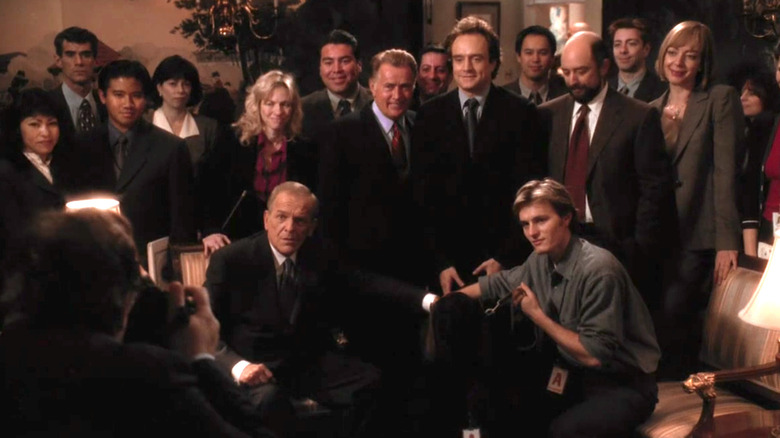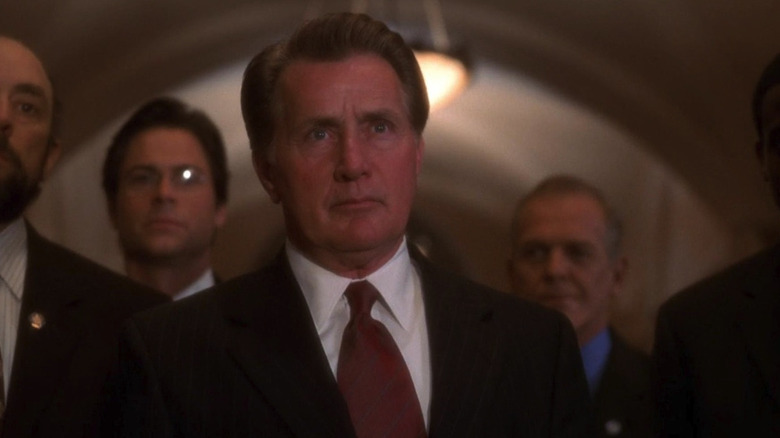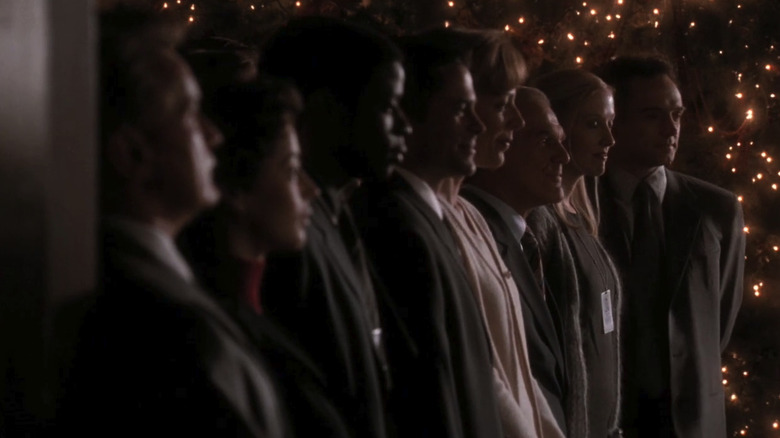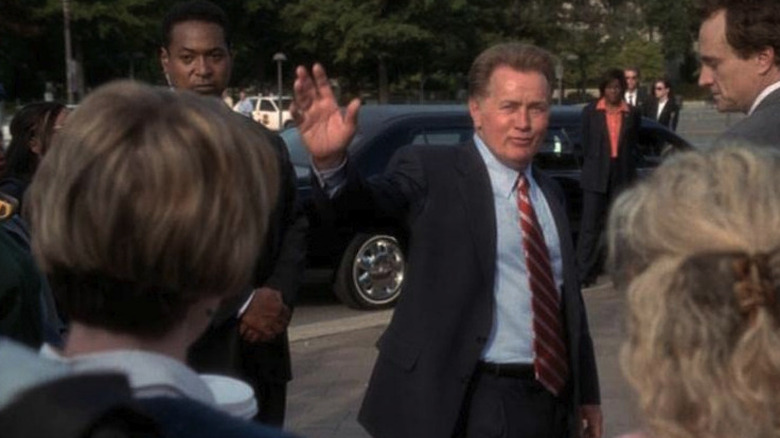NBC Didn't Have Much Faith In The Concept Of The West Wing
Today, Academy Award-winning writer Aaron Sorkin is known for creating complex characters who steal the hearts of viewers with witty dialogue and inspiring speeches. He's the man behind Jack Nicholson's declaration, "You can't handle the truth," and Will McAvoy's assertion that "America is not the greatest country in the world anymore." These days, Sorkin's ability to entertain an audience with the everyday lives of sportscasters, news anchors, and senior White House staff is above reproach, but that wasn't the case 24 years ago.
Since 2016, the world has been keeping a very close, no-nonsense eye on the political landscape, and The White House, but not so long ago it was all considered a big joke. In January 1998, the world was shaken when The Drudge Report revealed that President Bill Clinton was having an affair with a young White House intern, Monica Lewinsky. Suddenly, the highest office in the land was fodder for Saturday Night Live and late-night talk show hosts, and there was no longer any credibility left in politics. According to Empire's Definitive History of The West Wing, this is the reason that NBC initially delayed Sorkin's Emmy Award-winning show "The West Wing."
People don't care about politics
By 1995, Sorkin had written 2 Academy Award-winning films, "A Few Good Men" and "The American President," but he told Empire that he "never thought of doing television" until a friend suggested it:
"[Akiva Goldsman] said, 'You know what would make a good television series? That.' And he was pointing at The American President poster. He said, 'There doesn't have to be a romance, just focus on a senior staffer.' I said, 'That does sound like a good idea, but I'm not going to be doing a television series."
Sorkin didn't seriously consider the project until he attended a meeting with TV producer John Wells and Warner Brothers executives. The writer didn't know that his companions would be expecting a pitch, so he had nothing prepared to impress them. When they asked for his next idea, Sorkin panicked and offered up the project he'd discussed with Goldsman the night before. Wells was all in, but NBC needed convincing.
The Clinton-Lewinsky affair made the American government a popular topic for comedy sketch shows and late-night monologues, which made networks like NBC shy away from including anything remotely political in serious dramas. Fortunately, Wells wasn't quick to give up on the project.
"[I] had a six series deal at NBC, so I took it to them and told them I wanted to do this as part of the deal. They didn't want to make it. They felt that people didn't care about politics and it just wouldn't work. But the way my deal was structured, they had to either make it or give it back to me to set up someplace else so they finally said "Well okay, we'll make it but we don't want to make it this year."
The dialogue of Sorkin
After NBC delayed his first TV idea, Sorkin landed a deal with ABC to create a new show called "Sports Night," which earned two Emmys after its first season. The combination of this success and the fact that the Clinton affair was losing steam must have calmed NBC's nerves. In 1999, after a year delay, NBC greenlit "The West Wing," and the show won nine Emmys, but why was the public so captivated by a serious political drama after laughing at the president for the past year?
Quentin Tarantino calls Sorkin "the greatest active dialogist," which is a hell of a compliment to receive from one of the industry's top conversation crafters. Of course, the genius of Sorkin's writing is a major factor in the show's success, but it isn't the only one. "The West Wing" features an impressive cast of actors who bring Sorkin's dialogue to life, including Martin Sheen, Allison Janney, Rob Lowe, John Spencer, and Stockard Channing.
In a 2001 interview with Charlie Rose, Spencer explained how the series allowed the actors to show off their skills. "It's a great vehicle for actors. I mean, sometimes we get to speak pages of dialogue, which you never do in film or television." Richard Schiff added that Sorkin's dialogue was easily connected "to things that are emotional, so very often even though you have this volume of things to say, the moments reside in between the words."
While I believe all that's true, I think the greatest strength of the show, and the biggest reason so many people tuned in every week to watch it, lies with President Josiah Bartlet (Sheen).
An ideal president
President Bartlet is smart, moral, funny, and direct, but he's also humble and relatable. Basically, the opposite of what the American public usually finds itself led by. At a time when Americans had lost all faith and respect for real leaders, Sorkin's show gave us a fictional one that seemed worthy of our appreciation and trust. Sorkin admitted to Charlie Rose that the series was his "romantic vision of the way [politics] might be," which must have been inspiring and comforting for a public whose leader had been exposed as a philandering liar just a year before.
"The West Wing" ran for seven seasons, was nominated for 95 Emmys, and won 26 of them. On top of paving the way for later Emmy-winning political dramas like "House of Cards" and "Scandal," it also gave audiences an ideal to aim for and a sense of hope that was much needed at the time. Not bad for a show that NBC thought no one would watch.



